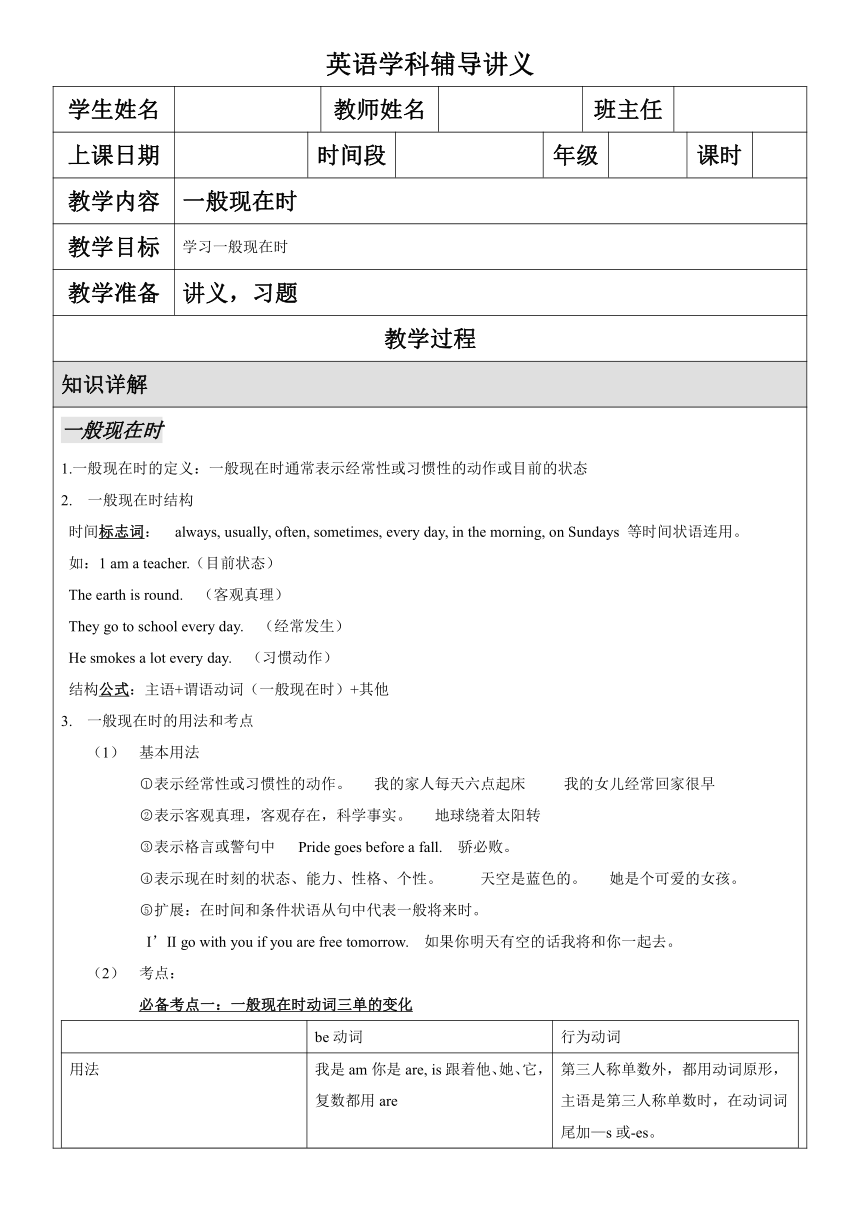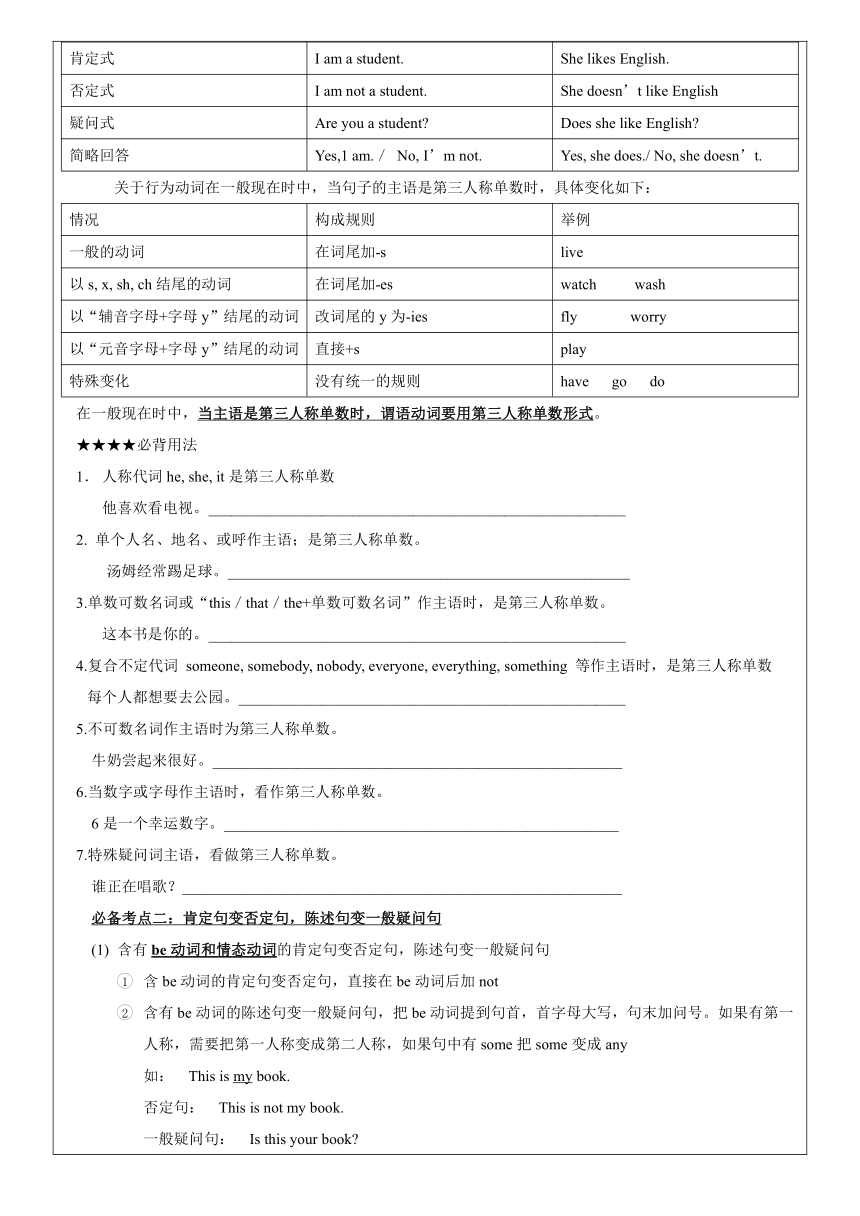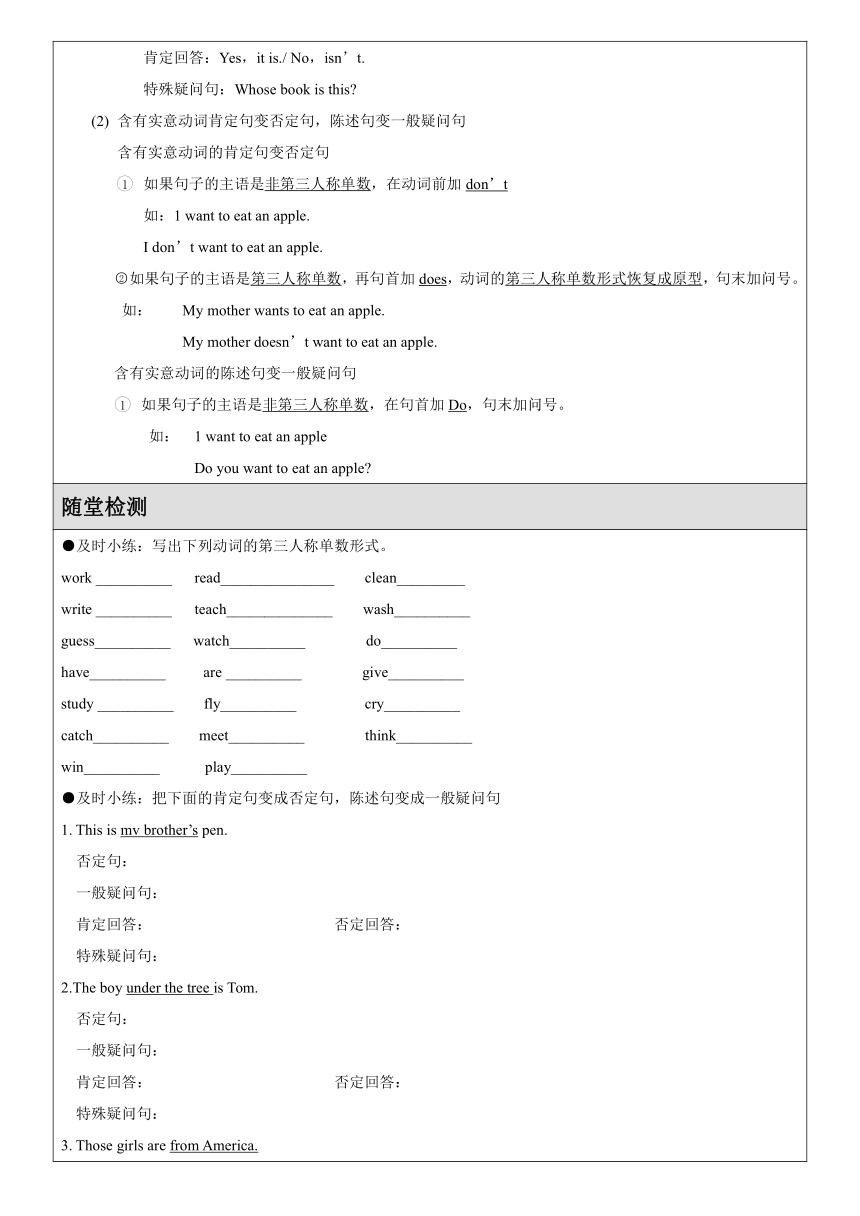人教PEP版英语六年级下册一般现在时讲义(无答案)
文档属性
| 名称 | 人教PEP版英语六年级下册一般现在时讲义(无答案) |  | |
| 格式 | docx | ||
| 文件大小 | 29.7KB | ||
| 资源类型 | 教案 | ||
| 版本资源 | 人教版(PEP) | ||
| 科目 | 英语 | ||
| 更新时间 | 2024-01-13 19:38:36 | ||
图片预览



文档简介
英语学科辅导讲义
学生姓名 教师姓名 班主任
上课日期 时间段 年级 课时
教学内容 一般现在时
教学目标 学习一般现在时
教学准备 讲义,习题
教学过程
知识详解
一般现在时 1.一般现在时的定义:一般现在时通常表示经常性或习惯性的动作或目前的状态 2. 一般现在时结构 时间标志词: always, usually, often, sometimes, every day, in the morning, on Sundays 等时间状语连用。 如:1 am a teacher.(目前状态) The earth is round. (客观真理) They go to school every day. (经常发生) He smokes a lot every day. (习惯动作) 结构公式:主语+谓语动词(一般现在时)+其他 一般现在时的用法和考点 基本用法 表示经常性或习惯性的动作。 我的家人每天六点起床 我的女儿经常回家很早 表示客观真理,客观存在,科学事实。 地球绕着太阳转 表示格言或警句中 Pride goes before a fall. 骄必败。 表示现在时刻的状态、能力、性格、个性。 天空是蓝色的。 她是个可爱的女孩。 扩展:在时间和条件状语从句中代表一般将来时。 I’II go with you if you are free tomorrow. 如果你明天有空的话我将和你一起去。 考点: 必备考点一:一般现在时动词三单的变化 be动词行为动词用法我是am你是are, is跟着他、她、它,复数都用are第三人称单数外,都用动词原形,主语是第三人称单数时,在动词词尾加—s或-es。肯定式I am a student.She likes English.否定式I am not a student.She doesn’t like English疑问式Are you a student Does she like English 简略回答Yes,1 am./ No, I’m not.Yes, she does./ No, she doesn’t.
关于行为动词在一般现在时中,当句子的主语是第三人称单数时,具体变化如下: 情况构成规则举例一般的动词在词尾加-slive 以s, x, sh, ch结尾的动词在词尾加-eswatch wash以“辅音字母+字母y”结尾的动词 改词尾的y为-iesfly worry以“元音字母+字母y”结尾的动词 直接+splay特殊变化没有统一的规则have go do
在一般现在时中,当主语是第三人称单数时,谓语动词要用第三人称单数形式。 ★★★★必背用法 人称代词he, she, it是第三人称单数 他喜欢看电视。_______________________________________________________ 2. 单个人名、地名、或呼作主语;是第三人称单数。 汤姆经常踢足球。_____________________________________________________ 3.单数可数名词或“this/that/the+单数可数名词”作主语时,是第三人称单数。 这本书是你的。_______________________________________________________ 4.复合不定代词 someone, somebody, nobody, everyone, everything, something 等作主语时,是第三人称单数 每个人都想要去公园。___________________________________________________ 5.不可数名词作主语时为第三人称单数。 牛奶尝起来很好。______________________________________________________ 6.当数字或字母作主语时,看作第三人称单数。 6是一个幸运数字。____________________________________________________ 7.特殊疑问词主语,看做第三人称单数。 谁正在唱歌?__________________________________________________________ 必备考点二:肯定句变否定句,陈述句变一般疑问句 含有be动词和情态动词的肯定句变否定句,陈述句变一般疑问句 含be动词的肯定句变否定句,直接在be动词后加not 含有be动词的陈述句变一般疑问句,把be动词提到句首,首字母大写,句末加问号。如果有第一人称,需要把第一人称变成第二人称,如果句中有some把some变成any 如: This is my book. 否定句: This is not my book. 一般疑问句: Is this your book 肯定回答:Yes,it is./ No,isn’t. 特殊疑问句:Whose book is this 含有实意动词肯定句变否定句,陈述句变一般疑问句 含有实意动词的肯定句变否定句 如果句子的主语是非第三人称单数,在动词前加don’t 如:1 want to eat an apple. I don’t want to eat an apple. 如果句子的主语是第三人称单数,再句首加does,动词的第三人称单数形式恢复成原型,句末加问号。 如: My mother wants to eat an apple. My mother doesn’t want to eat an apple. 含有实意动词的陈述句变一般疑问句 如果句子的主语是非第三人称单数,在句首加Do,句末加问号。 如: 1 want to eat an apple Do you want to eat an apple
随堂检测
●及时小练:写出下列动词的第三人称单数形式。 work __________ read_______________ clean_________ write __________ teach______________ wash__________ guess__________ watch__________ do__________ have__________ are __________ give__________ study __________ fly__________ cry__________ catch__________ meet__________ think__________ win__________ play__________ ●及时小练:把下面的肯定句变成否定句,陈述句变成一般疑问句 1. This is mv brother’s pen. 否定句: 一般疑问句: 肯定回答: 否定回答: 特殊疑问句: 2.The boy under the tree is Tom. 否定句: 一般疑问句: 肯定回答: 否定回答: 特殊疑问句: 3. Those girls are from America. 否定句: 一般疑问句: 肯定回答: 否定回答: 特殊疑问句: There is some water in the glass. 否定句: 一般疑问句: 肯定回答: 否定回答: 特殊疑问句: All of the students are from the countryside. 否定句: 一般疑问句: 肯定回答: 否定回答: 特殊疑问句: ●及时小练:把下面的陈述句分别变成否定句和一般疑问句。 1.I go to school on foot. 否定句: 一般疑问句: 肯定回答: 否定回答: 特殊疑问句: 2. She wants a cup of coffee. 否定句: 一般疑问句: 肯定回答: 否定回答: 特殊疑问句: 3. Mrs. Li and Kitty watch television at night. 否定句: 一般疑问句: 肯定回答: 否定回答: 特殊疑问句: 用动词be的适当形式填空。 There__________ some magazines on the table. They__________ not doctors, they__________ teachers. His name__________ John. He__________ a Middle school student. He__________ from America. What___________ in your bag __________ there any food in it Look who ___________ over there It__________ _Jack. 二、改错。 1. Is your brother speak English ___________ 2. Does he likes going fishing ___________ 3. He likes play games after class. ___________ 4. Mr. Wu teachs us English. ___________ 5. She don’t do her homework on Sundays. ___________ 三、单项选择。 1. Steven is a worker. He___________ in a factory. His sisters____________ in a hospital. A. work, work B. works, work C. work, works D. works, works 2. She ___________ music and often ___________ to music. A. like, listen B. likes, listens C. like, listen D. likes, listen 3. The twins usually___________ milk and bread for breakfast, but Jim___________ some porridge for it. A. have, has B. has, has C. has, have D. have, have 4. He usually____________ at six in the morning. A. get up B. gets up C. get D. got up 5.They _______the cinema twice a week. A. go to B. goes C. goes to D. went to 四、用括号内动词的适当形式填空 1. He often ___________ _(have) dinner at home. 2. Daniel and Tommy ____________ (be) in Class One. 3. We ___________ (not watch) TV on Mondays. 4. Nick ___________ _(not go) to the zoo on Sundays. 5. ___________ they ____________ (like) the World Cup 6, What ___________ they often ___________ _(do) on Saturdays 7.___________ your parents ___________ (read) newspapers every day 8. The girl___________ _(teach) us English on Sundays. 9. She and I___________ (take) a walk together every evening. 10. There ___________ (be) some water in the bottle. 1 1. Mike____________ (like) cooking. 12 ___________ they________ (have) the same hobby 13. My aunt___________ (look) after her baby carefully. 14. You always ___________ (do) your homework well. 15.I ____ (be) ill. I’m staying in bed. 16.___________ she___________ (go)to school from Monday to Friday 17.___________ Liu Tao___________ (like) P.E. 18. The child often ___________ (watch) TV in the evening. 19. Su Hai and Su Yang ____________ (have) eight lessons. 20.What day___________ _(be) it today 五、按照要求改写句子 1.Daniel watches TV every evening.(改为否定句) _______________________________________________________ 2.I do my homework every day.(改为一般疑问句,作否定回答) _______________________________________________________ 3.She likes milk.(改为一般疑问句,作肯定回答) _______________________________________________________ 4.Amy likes playing computer games.(改为一般疑问句,作否定回答) _______________________________________________________ 5.We go to school every morning.(改为否定句) _______________________________________________________ 6. He speaks English very well.(改为否定句) _______________________________________________________ I like taking photos in the park.(对划线部分提问) _______________________________________________________ 8. John comes from Canada.(对划线部分提问) _______________________________________________________ 9. She is always a good student.(改为一般疑问句,作否定回答) _______________________________________________________ 10. Simon and Daniel like going skating.(改为否定句) _______________________________________________________
学生姓名 教师姓名 班主任
上课日期 时间段 年级 课时
教学内容 一般现在时
教学目标 学习一般现在时
教学准备 讲义,习题
教学过程
知识详解
一般现在时 1.一般现在时的定义:一般现在时通常表示经常性或习惯性的动作或目前的状态 2. 一般现在时结构 时间标志词: always, usually, often, sometimes, every day, in the morning, on Sundays 等时间状语连用。 如:1 am a teacher.(目前状态) The earth is round. (客观真理) They go to school every day. (经常发生) He smokes a lot every day. (习惯动作) 结构公式:主语+谓语动词(一般现在时)+其他 一般现在时的用法和考点 基本用法 表示经常性或习惯性的动作。 我的家人每天六点起床 我的女儿经常回家很早 表示客观真理,客观存在,科学事实。 地球绕着太阳转 表示格言或警句中 Pride goes before a fall. 骄必败。 表示现在时刻的状态、能力、性格、个性。 天空是蓝色的。 她是个可爱的女孩。 扩展:在时间和条件状语从句中代表一般将来时。 I’II go with you if you are free tomorrow. 如果你明天有空的话我将和你一起去。 考点: 必备考点一:一般现在时动词三单的变化 be动词行为动词用法我是am你是are, is跟着他、她、它,复数都用are第三人称单数外,都用动词原形,主语是第三人称单数时,在动词词尾加—s或-es。肯定式I am a student.She likes English.否定式I am not a student.She doesn’t like English疑问式Are you a student Does she like English 简略回答Yes,1 am./ No, I’m not.Yes, she does./ No, she doesn’t.
关于行为动词在一般现在时中,当句子的主语是第三人称单数时,具体变化如下: 情况构成规则举例一般的动词在词尾加-slive 以s, x, sh, ch结尾的动词在词尾加-eswatch wash以“辅音字母+字母y”结尾的动词 改词尾的y为-iesfly worry以“元音字母+字母y”结尾的动词 直接+splay特殊变化没有统一的规则have go do
在一般现在时中,当主语是第三人称单数时,谓语动词要用第三人称单数形式。 ★★★★必背用法 人称代词he, she, it是第三人称单数 他喜欢看电视。_______________________________________________________ 2. 单个人名、地名、或呼作主语;是第三人称单数。 汤姆经常踢足球。_____________________________________________________ 3.单数可数名词或“this/that/the+单数可数名词”作主语时,是第三人称单数。 这本书是你的。_______________________________________________________ 4.复合不定代词 someone, somebody, nobody, everyone, everything, something 等作主语时,是第三人称单数 每个人都想要去公园。___________________________________________________ 5.不可数名词作主语时为第三人称单数。 牛奶尝起来很好。______________________________________________________ 6.当数字或字母作主语时,看作第三人称单数。 6是一个幸运数字。____________________________________________________ 7.特殊疑问词主语,看做第三人称单数。 谁正在唱歌?__________________________________________________________ 必备考点二:肯定句变否定句,陈述句变一般疑问句 含有be动词和情态动词的肯定句变否定句,陈述句变一般疑问句 含be动词的肯定句变否定句,直接在be动词后加not 含有be动词的陈述句变一般疑问句,把be动词提到句首,首字母大写,句末加问号。如果有第一人称,需要把第一人称变成第二人称,如果句中有some把some变成any 如: This is my book. 否定句: This is not my book. 一般疑问句: Is this your book 肯定回答:Yes,it is./ No,isn’t. 特殊疑问句:Whose book is this 含有实意动词肯定句变否定句,陈述句变一般疑问句 含有实意动词的肯定句变否定句 如果句子的主语是非第三人称单数,在动词前加don’t 如:1 want to eat an apple. I don’t want to eat an apple. 如果句子的主语是第三人称单数,再句首加does,动词的第三人称单数形式恢复成原型,句末加问号。 如: My mother wants to eat an apple. My mother doesn’t want to eat an apple. 含有实意动词的陈述句变一般疑问句 如果句子的主语是非第三人称单数,在句首加Do,句末加问号。 如: 1 want to eat an apple Do you want to eat an apple
随堂检测
●及时小练:写出下列动词的第三人称单数形式。 work __________ read_______________ clean_________ write __________ teach______________ wash__________ guess__________ watch__________ do__________ have__________ are __________ give__________ study __________ fly__________ cry__________ catch__________ meet__________ think__________ win__________ play__________ ●及时小练:把下面的肯定句变成否定句,陈述句变成一般疑问句 1. This is mv brother’s pen. 否定句: 一般疑问句: 肯定回答: 否定回答: 特殊疑问句: 2.The boy under the tree is Tom. 否定句: 一般疑问句: 肯定回答: 否定回答: 特殊疑问句: 3. Those girls are from America. 否定句: 一般疑问句: 肯定回答: 否定回答: 特殊疑问句: There is some water in the glass. 否定句: 一般疑问句: 肯定回答: 否定回答: 特殊疑问句: All of the students are from the countryside. 否定句: 一般疑问句: 肯定回答: 否定回答: 特殊疑问句: ●及时小练:把下面的陈述句分别变成否定句和一般疑问句。 1.I go to school on foot. 否定句: 一般疑问句: 肯定回答: 否定回答: 特殊疑问句: 2. She wants a cup of coffee. 否定句: 一般疑问句: 肯定回答: 否定回答: 特殊疑问句: 3. Mrs. Li and Kitty watch television at night. 否定句: 一般疑问句: 肯定回答: 否定回答: 特殊疑问句: 用动词be的适当形式填空。 There__________ some magazines on the table. They__________ not doctors, they__________ teachers. His name__________ John. He__________ a Middle school student. He__________ from America. What___________ in your bag __________ there any food in it Look who ___________ over there It__________ _Jack. 二、改错。 1. Is your brother speak English ___________ 2. Does he likes going fishing ___________ 3. He likes play games after class. ___________ 4. Mr. Wu teachs us English. ___________ 5. She don’t do her homework on Sundays. ___________ 三、单项选择。 1. Steven is a worker. He___________ in a factory. His sisters____________ in a hospital. A. work, work B. works, work C. work, works D. works, works 2. She ___________ music and often ___________ to music. A. like, listen B. likes, listens C. like, listen D. likes, listen 3. The twins usually___________ milk and bread for breakfast, but Jim___________ some porridge for it. A. have, has B. has, has C. has, have D. have, have 4. He usually____________ at six in the morning. A. get up B. gets up C. get D. got up 5.They _______the cinema twice a week. A. go to B. goes C. goes to D. went to 四、用括号内动词的适当形式填空 1. He often ___________ _(have) dinner at home. 2. Daniel and Tommy ____________ (be) in Class One. 3. We ___________ (not watch) TV on Mondays. 4. Nick ___________ _(not go) to the zoo on Sundays. 5. ___________ they ____________ (like) the World Cup 6, What ___________ they often ___________ _(do) on Saturdays 7.___________ your parents ___________ (read) newspapers every day 8. The girl___________ _(teach) us English on Sundays. 9. She and I___________ (take) a walk together every evening. 10. There ___________ (be) some water in the bottle. 1 1. Mike____________ (like) cooking. 12 ___________ they________ (have) the same hobby 13. My aunt___________ (look) after her baby carefully. 14. You always ___________ (do) your homework well. 15.I ____ (be) ill. I’m staying in bed. 16.___________ she___________ (go)to school from Monday to Friday 17.___________ Liu Tao___________ (like) P.E. 18. The child often ___________ (watch) TV in the evening. 19. Su Hai and Su Yang ____________ (have) eight lessons. 20.What day___________ _(be) it today 五、按照要求改写句子 1.Daniel watches TV every evening.(改为否定句) _______________________________________________________ 2.I do my homework every day.(改为一般疑问句,作否定回答) _______________________________________________________ 3.She likes milk.(改为一般疑问句,作肯定回答) _______________________________________________________ 4.Amy likes playing computer games.(改为一般疑问句,作否定回答) _______________________________________________________ 5.We go to school every morning.(改为否定句) _______________________________________________________ 6. He speaks English very well.(改为否定句) _______________________________________________________ I like taking photos in the park.(对划线部分提问) _______________________________________________________ 8. John comes from Canada.(对划线部分提问) _______________________________________________________ 9. She is always a good student.(改为一般疑问句,作否定回答) _______________________________________________________ 10. Simon and Daniel like going skating.(改为否定句) _______________________________________________________
同课章节目录
